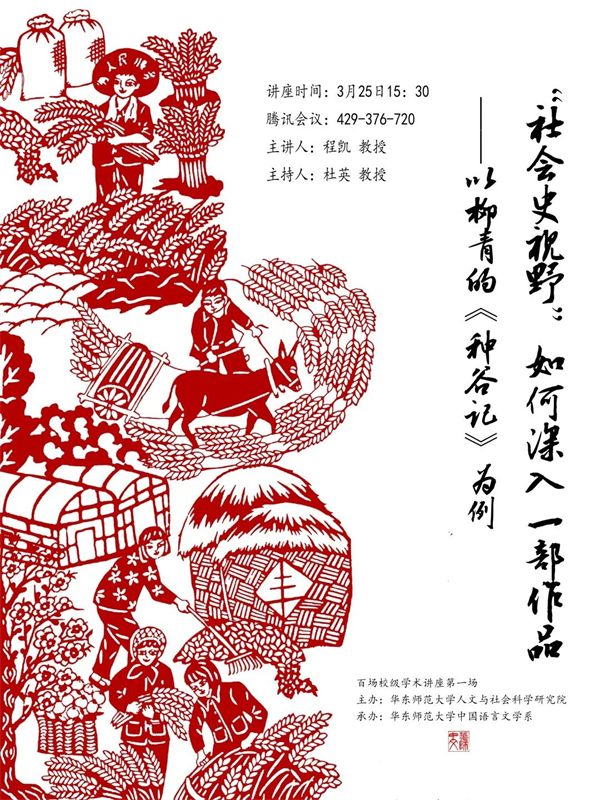
How does "social history vision" penetrate into a work —— Taking Liu Qing’s "Planting Valley" as an example
Time:15:30 on March 25th (Friday)
Location:Tencent conference (ID: 429376720)
Speaker:Cheng Kai (researcher, Institute of Literature, China Academy of Social Sciences, professor, Department of University Literature, Chinese Academy of Social Sciences)
In 1943, Mao Zedong’s "Speech at Yan ‘an Forum on Literature and Art" was published, which was the starting point. As a writer with the highest achievements in "People’s Literature" and socialist realism writing in the 1940s and 1970s, Liu Qing’s mature creation began in 1943. Liu Qing’s "The Story of a Kind of Valley" can be regarded as a masterpiece in the process of transforming from the realism of "modern literary form" to the realism of "contemporary literary form". At the same time, it is also a work that is particularly suitable for analysis from the perspective of social history. The lecture attempts to analyze the special creative experience from the perspective of "social history" and the historical understanding value contained in the works.
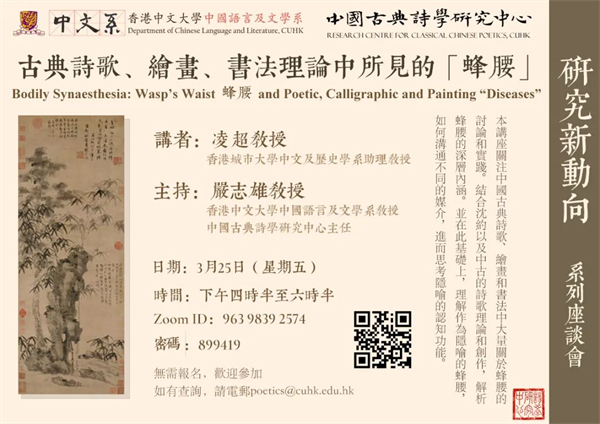
"Bee waist" seen in classical poetry, painting and calligraphy theory
Time:March 25th (Friday) 16:30-18:30.
Location:ZOOM conference (ID: 96398392574, password: 899419)
Speaker:Ling Chao (Assistant Professor, Department of Chinese and History, City University of Hong Kong)
This lecture focuses on the discussion and practice of bee waist in China’s classical poetry, painting and calligraphy, and analyzes the deep connotation of bee waist by combining Shen Yue’s and medieval poetry theory and creation. On this basis, it understands how bee waist as a metaphor communicates with different media, and then thinks about the cognitive function of metaphor.
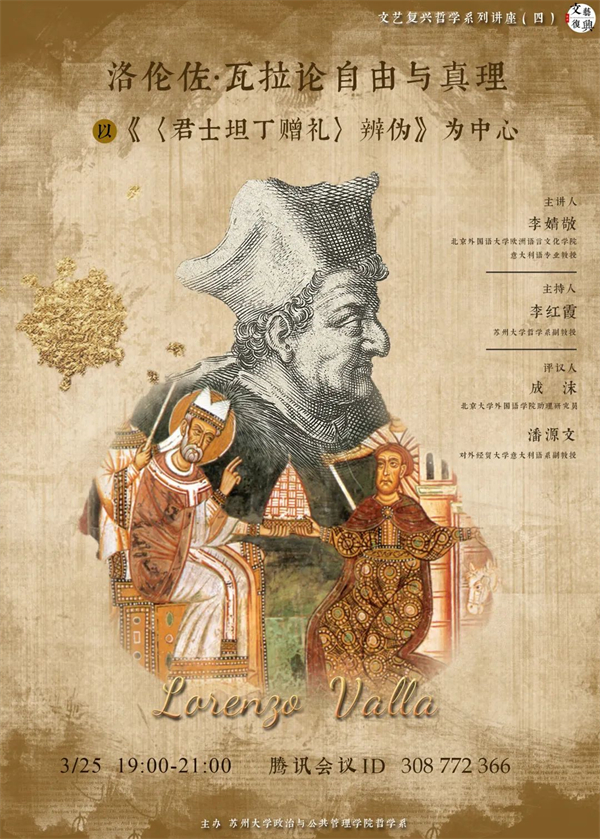
Lorenzo Vara’s Theory of Freedom and Truth: Focusing on Discrimination of Falsifications from the Gift of Constantine
Time:March 25th (Friday) from 19: 00 to 21: 00.
Location:Tencent Conference (ID: 308772366), Bili Bili Renaissance and Modern Philosophy
Speaker:Li Jingjing (Professor, School of European Language and Culture, Beijing Foreign Studies University)
As one of the representative works of Italian humanist thinker Lorenzo Valla in the 15th century, The Gift of Constantine has been recorded in history because it successfully exposed the most notorious lies in the history of Christianity for the first time by means of philology. Based on the translation and introduction of this document, this lecture not only analyzes a series of strategies adopted in philology, rhetoric, logic and law to distinguish falsifications, thus expounding its "technical" innovation in the field of historical textual research, but also focuses on the author Vala’s religious concept beyond his political position and his thoughts on "freedom", "truth" and "belief".
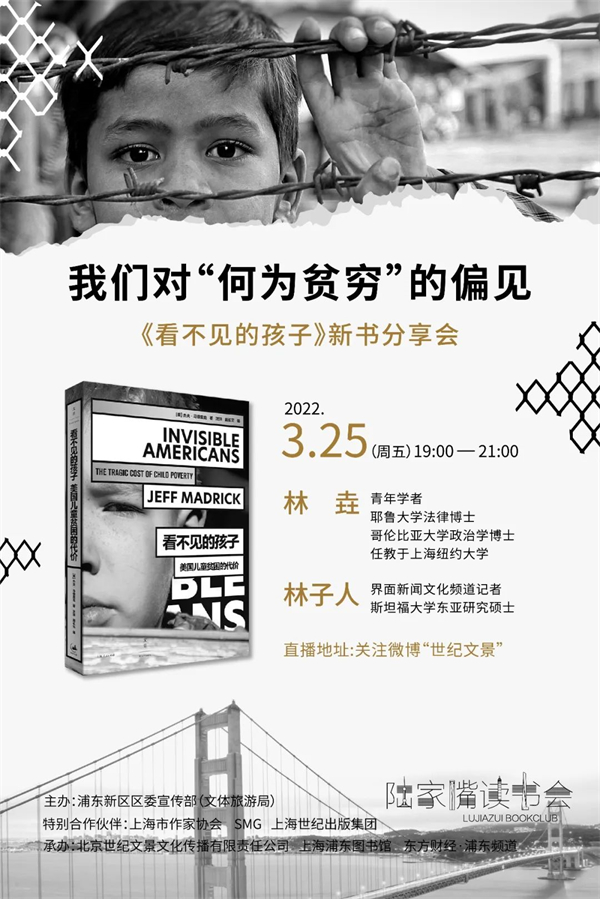
Our Prejudice on "What is Poverty" —— Sharing Meeting of Invisible Children’s New Book
Time:March 25th (Friday) from 19: 00 to 21: 00.
Location:"Century Wenjing" Sina Weibo
Guest:Lin Yao (researcher of "Society from a Global Perspective" in nyu shanghai) and Lin Ziren (reporter)
The book Invisible Children: The Cost of Child Poverty in the United States reveals the invisible side of the United States: 13 million children in the United States live in poverty, that is, 1/6 children live below the poverty line, which is 1/10 in France and Germany and 1/30 in Nordic countries. However, Americans cannot reach a consensus on poverty. On the evening of March 25th, Lin Yao, a doctor of law from Yale University and a doctor of political science from Columbia University, who is currently teaching in nyu shanghai, and Lin Ziren, a reporter from Interface News and Culture Channel, will visit Yun at Lujiazui Reading Club. The two teachers will talk about the enlightenment brought by American children’s poverty from the perspective of American attitudes and welfare policies.
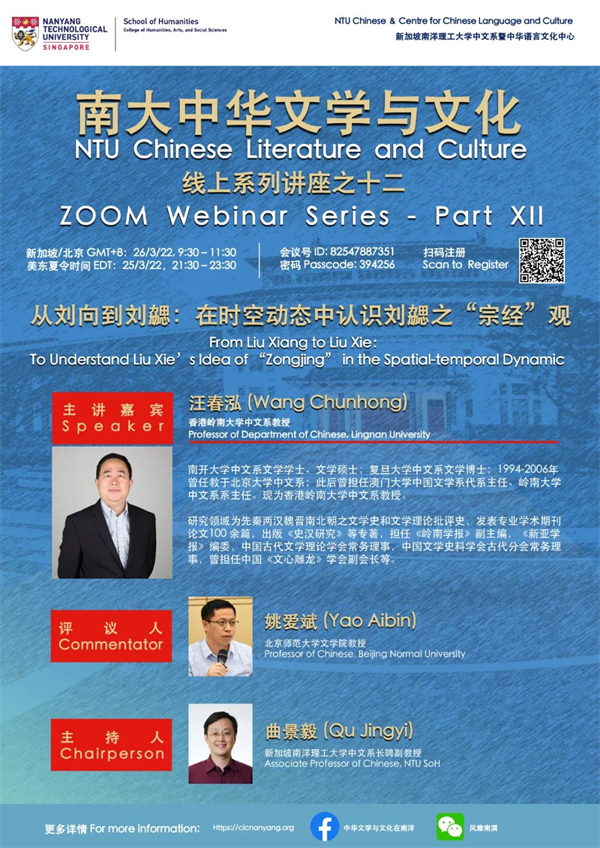
From Liu Xiang to Liu Xie: Understanding Liu Xie’s View of "Zong Jing" in the Temporal and Spatial Dynamics
Time:March 26th (Saturday) 9:30-11:30.
Location:ZOOM conference (ID: 82547887351, password: 394256)
Speaker:Wang Chunhong (Professor, Chinese Department, Lingnan University, Hong Kong)
In recent decades, the study of "dragon science" has encountered bottlenecks, especially on some key points. For a long time, there have been various lawsuits in academic circles, and no one can agree. This lecture focuses on the relationship between Liu Xie and Liu Xiang and Liu Xin in the pre-Han Dynasty, and makes an inquiry into the "Zongjing" and related topics of Wen Xin Diao Long, so as to prove that Wen Xin Diao Long has an indissoluble bond with Xiang and Xin’s father and son in terms of concept and style. And this kind of influence accepted by Liu Xie, this topic will be analyzed and discussed in two dimensions of time and space, so as to promote some issues and make the "Dragon Learning" people narrow their differences and reach a consensus!
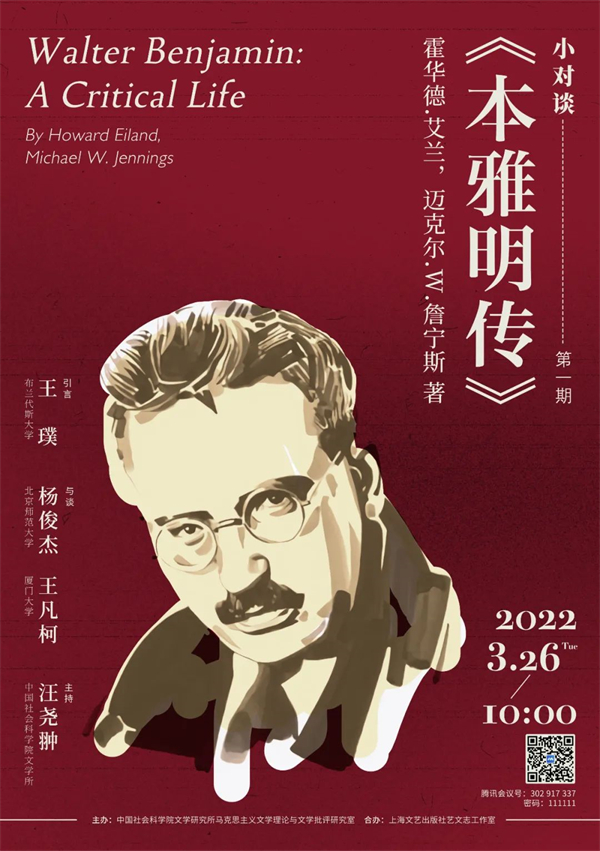
The first issue of "Little Conversation": The Biography of Benjamin
Time:March 26th (Saturday) 10:00-12:30.
Location:Tencent conference (ID: 302917337, password: 111111)
Guest:Wang pu (Associate Professor, brandeis University, USA), Yang Junjie (Associate Professor, Institute of Comparative Literature and World Literature, School of Liberal Arts, Beijing Normal University), Wang Fanke (Associate Professor, European Department, School of Foreign Languages, Xiamen University) and Wang Yaochu (Associate Research Fellow, Institute of Literature, China Academy of Social Sciences).
The upcoming Chinese version of The Biography of Benjamin is "the most comprehensive biography of Benjamin that we are likely to read so far. The two authors have spent almost their whole lives studying Benjamin … Their exposition of Benjamin’s thought is exemplary and their exploration of his personal life is amazing. ". (Modris Eksteins, The Wall Street Journal) In the first issue of the series of small dialogues, we invited several guests to read this biography online.
"Invisible" Jiangnan —— Protection and Transformation of Modern Art Resources in China
Time:14:00 on Saturday, March 26th.
Location:Bi Li Bi Li Hai Su Lecture Hall
Speaker:Li Chao (Associate Dean, Professor and Doctoral Supervisor, Shanghai Academy of Fine Arts, Shanghai University)
With the development of modern fine arts, Jiangnan culture played a very important role in the development of modern fine arts in China, and left many important cultural heritages of Jiangnan in history, including works and documents. In this lecture, Mr. Li Chao will share with us how to protect, transform and regenerate the cultural resource "Jiangnan" from the perspective of cultural resources, not limited to a historical geographical space concept.
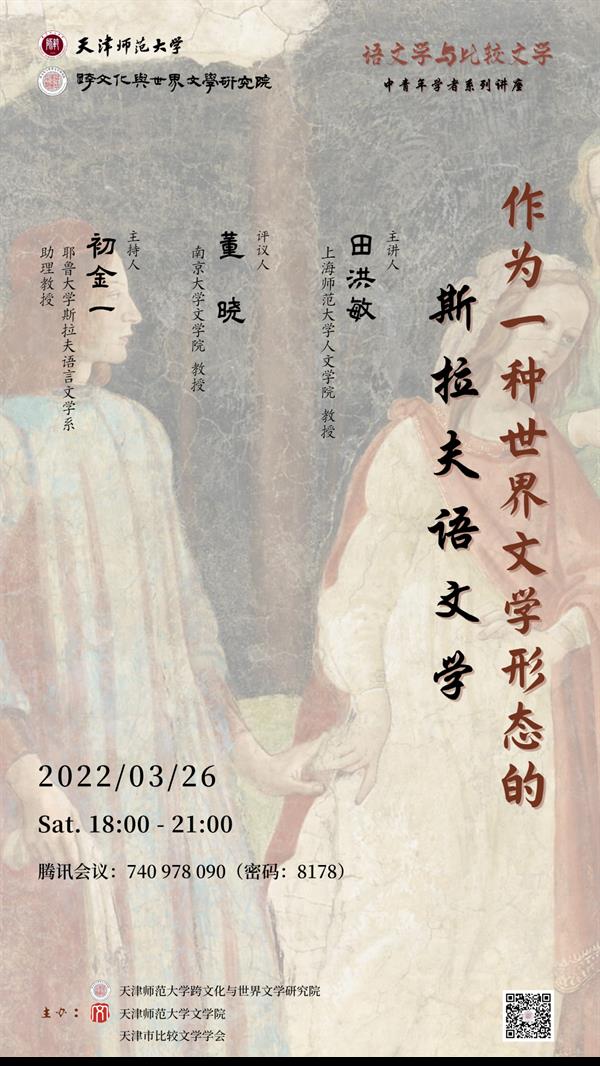
Slavic literature as a world literary form
Time:March 26th (Saturday) 18:00-21:00
Location:Tencent conference (ID: 740978090, password: 8178)
Speaker:Tian Hongmin (Professor of Comparative Literature and World Literature and Doctoral Supervisor, Shanghai Normal University)
Slavic philology has always regarded the construction of a new concept of "world literature" as its own responsibility and put it into practice as a "literary theory" and a "literary event" from its emergence until today in the 21st century. Obviously, this is quite different from the understanding of philology in other European and American countries. Specifically, the occurrence and development of Slavic Literature intensified into formalism which began in the 1910s and ended with Lautemann’s death in 1993. Since then, the theory of decline or "prosperity" of literary theory can only be investigated in the form of Slavic Literature from (Central) Eastern Europe to Russia in the literary sense.
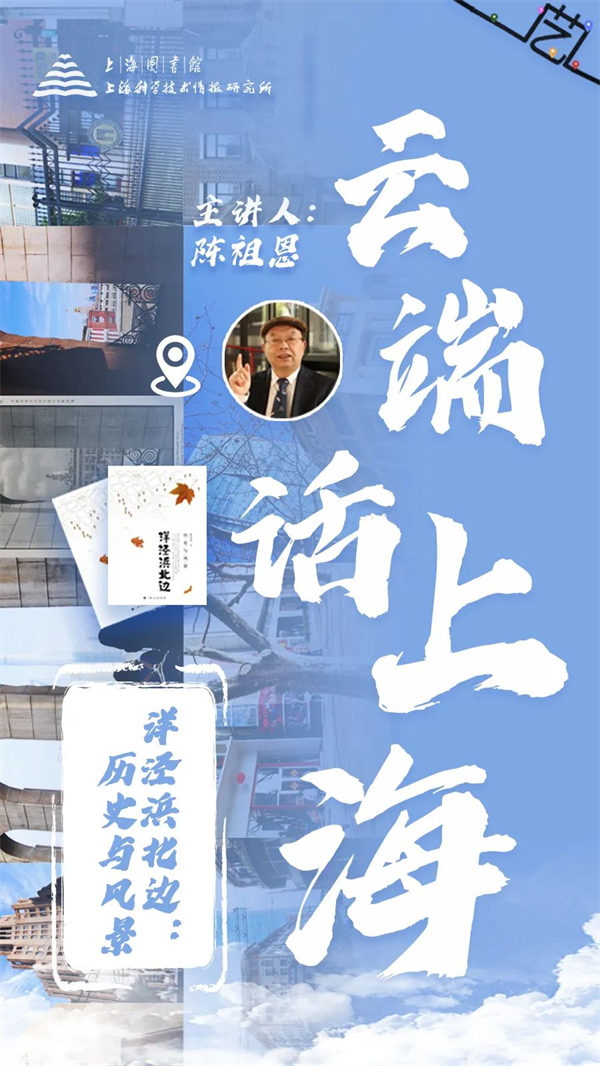
North of Pidgin: History and Scenery
Time:19:00 on March 26th (Saturday)
Location:Shanghai Library WeChat Video Number, Leyou Shanghai WeChat Video Number
Speaker:Chen Zuen (Professor of Modern History in China, Special Research Fellow, Institute of History, Shanghai Academy of Social Sciences)
"Pidgin" is a special image in modern Shanghai and an important cultural symbol of Shanghai culture. To the north of Pidgin, that is, to the north of Yan ‘an East Road, especially around Sima Road (Fuzhou Road), there are many bookstores and newspapers, and many scholars in modern times are active here. This time, we invited Mr. Chen Zuen, a professor of modern history in China and a special researcher at the Institute of History of Shanghai Academy of Social Sciences, to lead us to visit urban humanities and enter modern history. Through the old brick and stone landscape, we found the first big Japanese trading company to enter Shanghai, sought the famous place of Sino-Japanese cultural exchange in the late Qing Dynasty, and led the western restaurant in Shanghai … Listen to the story behind the "North of Pidgin" told by Teacher Chen Zuen.
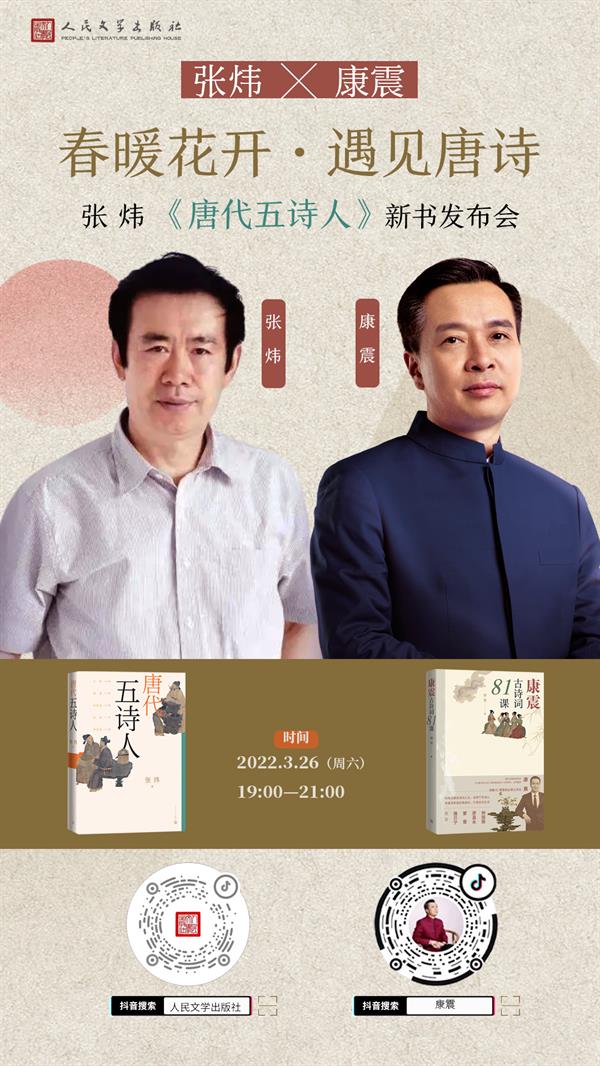
Spring Blossoms Meet Tang Poetry —— The New Book Release Conference of Five Poets in Tang Dynasty
Time:March 26th (Saturday) 19:00-21:00.
Location:Tik Tok Kang Zhen live room, Tik Tok People’s Literature Publishing House live room, People’s Literature Publishing House WeChat video number.
Guest:Zhang Wei (writer) and Kang Zhen (professor and doctoral supervisor of Beijing Normal University)
Recently, Five Poets in Tang Dynasty, a brand-new cultural essay by Zhang Wei, an award-winning writer of Mao Dun Literature Prize, was grandly published by People’s Literature Publishing House. This book selects five important poets in the Tang Dynasty, Wang Wei, Han Yu, Bai Juyi, Du Mu and Li Shangyin, and goes deep into the different spiritual and artistic worlds of poets from the perspectives of history, philosophy, poetics, aesthetics, literary history and writing. In the Tang poetry, we met these poets, and in the poet’s life, we met ourselves. On the evening of March 26th, Zhang Wei and his new book Five Poets of the Tang Dynasty, together with Kang Zhen, a professor and doctoral supervisor of Beijing Normal University, chatted about Tang poetry in spring!
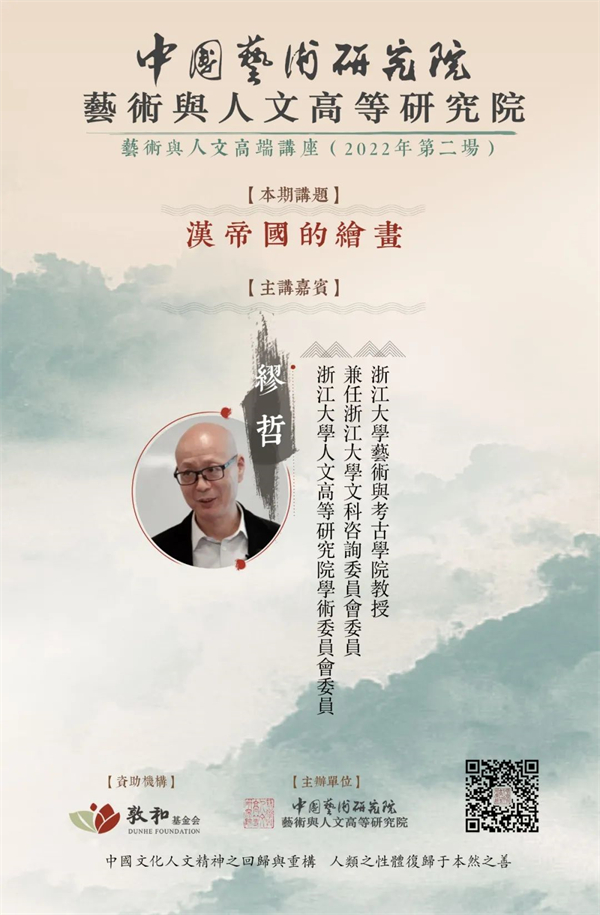
Painting of Han Empire
Time:March 26th (Saturday) 19:30.
Location:Wind Live, Bili Bili Advanced Research Institute of Art and Humanities
Speaker:Miao Zhe (Professor, School of Art and Archaeology, Zhejiang University)
The germination of China’s painting appeared in the 6th century BC, that is, during the Spring and Autumn Period and the Warring States Period. At the turn of the Han Dynasty, around the 1st century A.D., it replaced graphic design and became the primary type of two-dimensional art in China. After more than 100 years, that is, in the middle and late Eastern Han Dynasty, the basic techniques of reappearing painting, such as the presentation techniques of volume and space, were invented, thus ending the classical era of China’s painting. Then, what is the relationship between the birth and establishment of painting in the Warring States, Qin and Han Dynasties and the social change, knowledge production and symbol system in this period? At the turn of the Han Dynasty, that is, the "axis moment" when the painting tradition was established, how did the etiquette and ideology of the Han Empire "transform" into painting and further promote the birth of the painting tradition? On March 26th, the Institute of Advanced Studies in Arts and Humanities of China Academy of Art will hold the second high-end lecture on art and humanities this year, and Mr. Miao Zhe, a professor from the School of Art and Archaeology of Zhejiang University and the author of "From Lingguang Hall to Wuliangci: The Legacy of Imperial Art in the Han Dynasty", will be invited to give a report on "Painting of the Han Empire".
Common Reading of Meiyuan Classics: Two-faced Man by Tan
Time:March 27th (Sunday) 15:00-17:30.
Location:Tencent conference (ID: 172136202)
Speaker:Tan (Professor, School of Ethnology and Sociology, Yunnan University)
"Two-faced Man" is a story about the history of rural life. These individual life courses, which are often brushed aside, are described by the author Tan in the form of "Historical Records", forming a magnificent field painting volume spanning more than 60 years. In this issue of Meiyuan Classic Reading Salon, Tan, the author of Two-faced People, was invited to lead us to let go of the stereotype of the countryside and walk into Chengcun village in Lingnan to feel its unique humanistic style and the spirit of the times reflected by it.
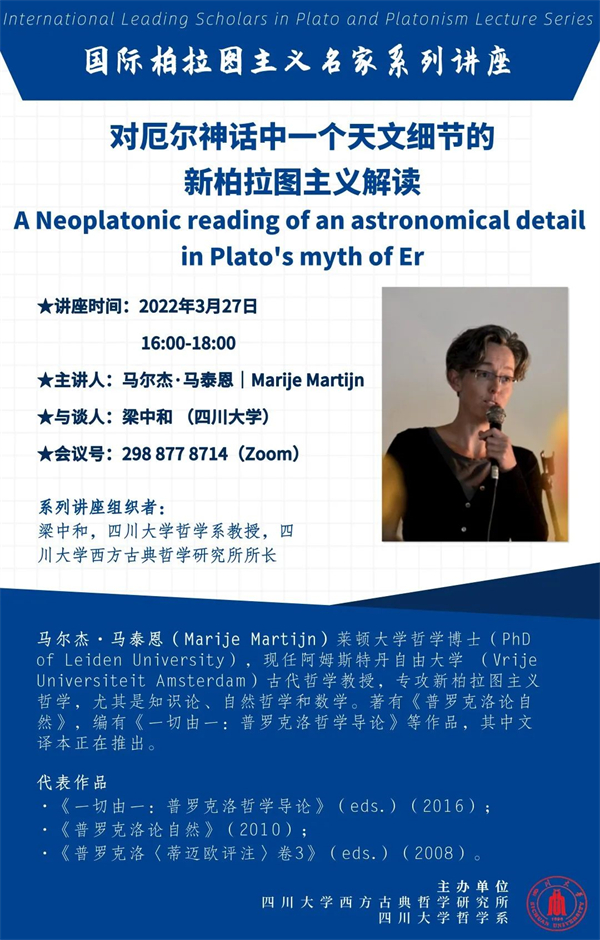
A Neoplatonic Interpretation of an Astronomical Detail in Earle’s Myth
Time:March 27th (Sunday) 16:00-18:00.
Location:ZOOM conference (ID: 2988778714)
Speaker:Marje Mateen (Professor of Ancient Philosophy, Free University of Amsterdam, Netherlands)
In the third lecture of the series of international famous Platonists, Professor Marje Mateen, who specializes in neo-Platonism, was invited to give a lecture on "A neo-Platonistic interpretation of an astronomical detail in Earle’s myth".
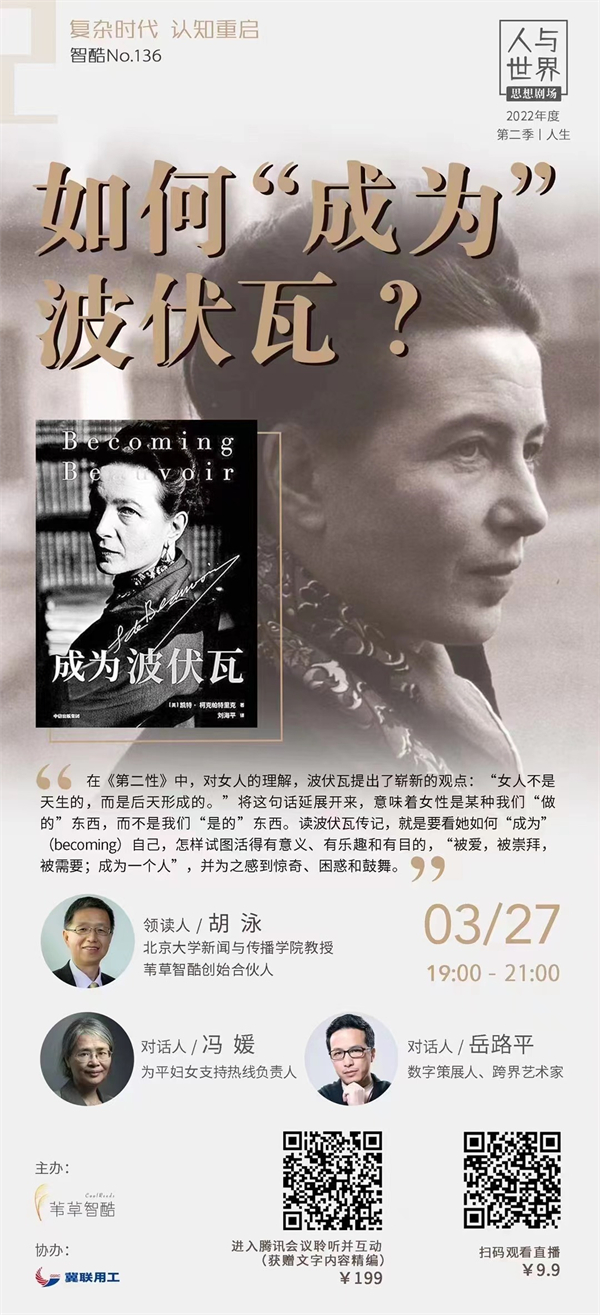
How to "become" Beauvoir?
Time:March 27th (Sunday) 19:00-21:00.
Location:Tencent conference
Guest:Hu Yong (Professor, School of Journalism and Communication, Peking University), Feng Yuan (Head of Ping Women’s Support Hotline) and Yue Luping (Digital Curator, Cross-border Artist).
In The Second Sex, Beauvoir put forward a brand-new view on the understanding of women: "Women are not born, but formed the day after tomorrow." Extending this sentence means that women are something we "do", not something we "are". In this issue of "People and the World Thought Theater", we invite Professor Hu Yong from Peking University to read Becoming Beauvoir for everyone. Reading Beauvoir’s biography is to see how she "becoming" herself, how she tries to live a meaningful, interesting and purposeful life, and "is loved, worshipped and needed; Become a person ",and feel surprised, confused and encouraged by it.
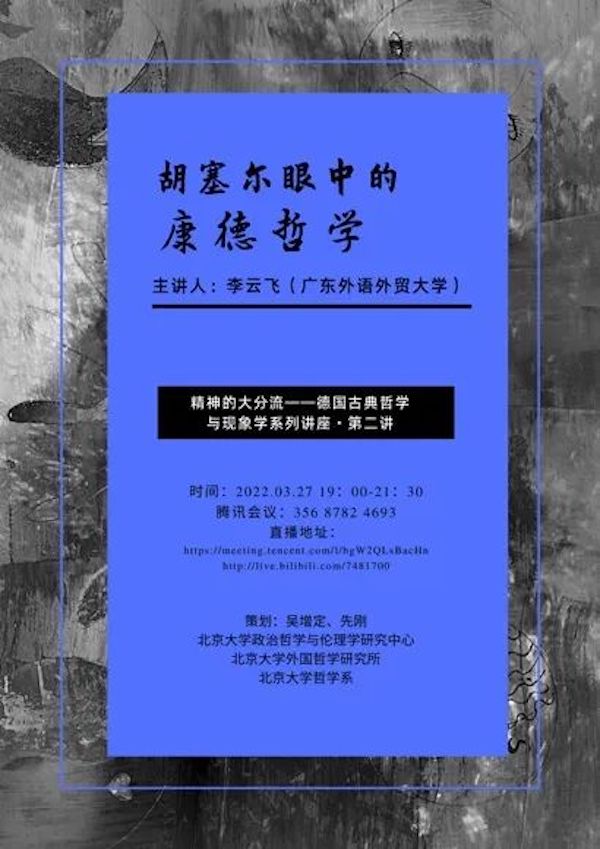
Kant’s philosophy in Husserl’s eyes
Time:March 27th (Sunday) 19:00-21:30.
Location:Tencent Conference (ID: 35687824693), Bili Bili Renaissance and Modern Philosophy
Speaker:Li Yunfei (Professor, School of Marxism, Guangdong University of Foreign Studies)
Husserl viewed Kant’s philosophy from the perspective of teleology-history. With this perspective, Husserl’s Kant’s philosophy was woven into the unified process of modern philosophy development and considered. Therefore, Husserl’s criticism of Kant’s philosophy is essentially a systematic reflection on the unified process of the development of modern philosophy from the perspective of Kant’s philosophy. The significance of Husserl’s critique of Kant’s philosophy lies in: 1) It reveals the unity of meaning of teleology in modern philosophy and deepens the understanding of phenomenology itself; 2) It clarifies Kant’s scientific style and reveals the universal significance of all previous philosophies. 3) It clarifies the deepest intention of Kant’s philosophy and its theoretical dilemma, puts philosophy in front of the final turning point and ruling, and clarifies the purpose of the development of modern philosophy: phenomenology is the secret vision of the whole modern philosophy.
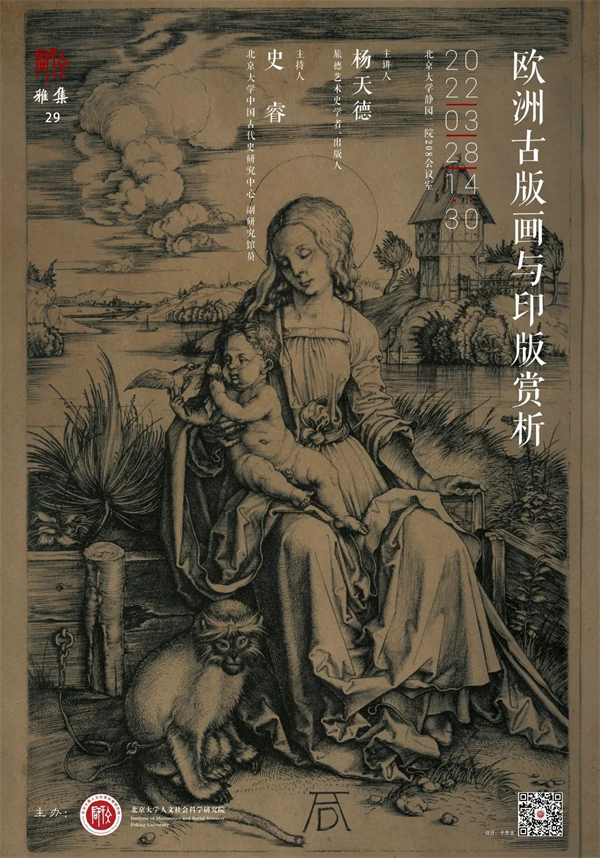
Appreciation of European ancient prints and printing plates
Time:14:30 on March 28th (Monday)
Location:Tencent conference
Speaker:Yang Tiande (art historian, collector, publisher)
In recent years, the domestic interest in the collection and research of western ancient prints has been increasing, but its original printing plates rarely appear and are not known to the public. In view of this, this lecture will explain the creative characteristics, artistic schools, prevailing periods and social background of different types of prints in a simple way through the intuitive display of more than ten printing plates in early Europe, such as woodcut engraving, woodcut engraving, engraved copper plate, engraved steel plate, photographic copper plate, stone plate and zinc plate, combined with the emergence and development of papermaking and movable type printing technology in Europe; At the same time, supplemented by the original rare prints such as Gutenberg printed pages, cradle-printed woodblock prints, Schengel copperplate prints, Diu Lei copperplate and woodblock prints, this paper systematically introduces the gradual development and evolution of European printmaking and book illustration art from the 15th century to the early 20th century.
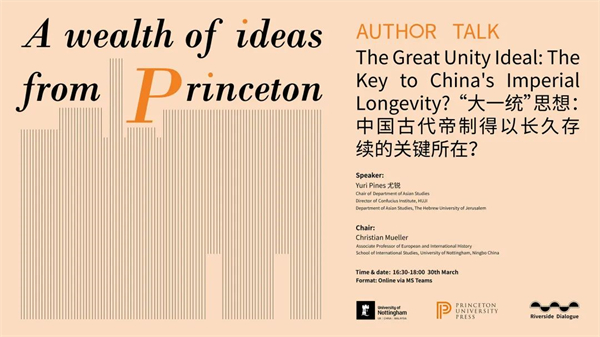
The Thought of "Great Unity": The Key to the Long-term Existence of Ancient Imperial System in China?
Time:March 30th (Wednesday) 16:30-18:00.
Location:ZOOM conference (ID: 99424056769)
Speaker:You Rui (Michael W. Lipson Professor of Sinology, Hebrew University)
It is an inevitable trend in the history of the world empire that "long-term cooperation will lead to separation", but "long-term separation will lead to separation" is a unique phenomenon in China history. One of the most striking features of ancient imperial system in China is its extraordinary persistence. In this lecture, Yuri Pines, a professor of sinology at Michael W. Lipson of Hebrew University, will explore the reasons for the continuation of the monarchy from the perspectives of ideology and political culture.
Attachment: Preview of offline activities
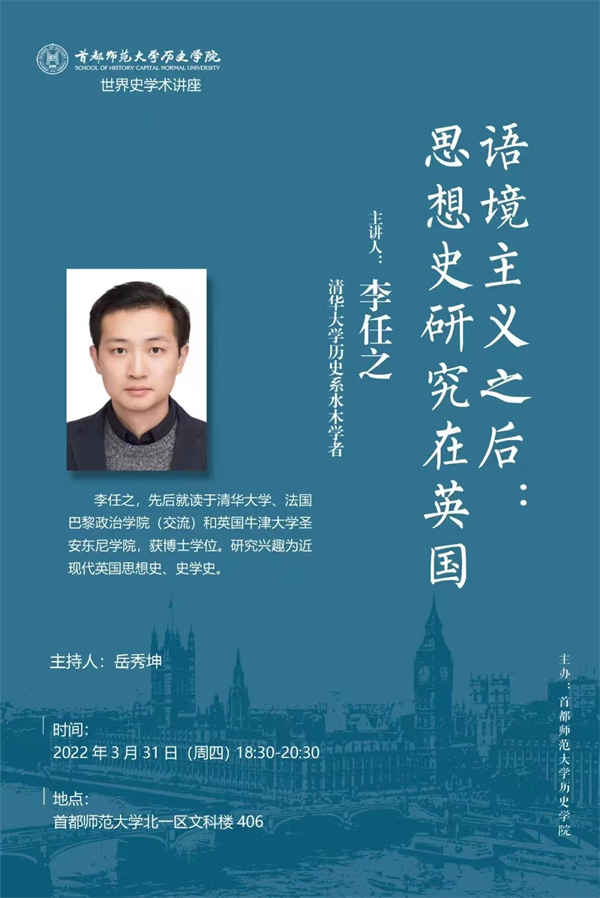
Beijing | After Contextualism: Research on the History of Thought in Britain
Time:March 31st (Thursday) 18:30-20:30
Location:Room 406, Wenke Building, North Zone 1, Capital Normal University, No.105 West Third Ring Road, Haidian District
Speaker:Li Renzhi (Shui Mu Scholar, Tsinghua University History Department)
In the "Academic Lecture on World History" series of the School of History of Capital Normal University, Li Renzhi is invited to give a lecture on the study of the history of ideas in Britain. Mr. Li studied in Tsinghua University, Paris School of Political Science (Exchange) and St. Anthony’s College, Oxford University, England, and received a doctorate. His research interests are the history of modern British thought and historiography.
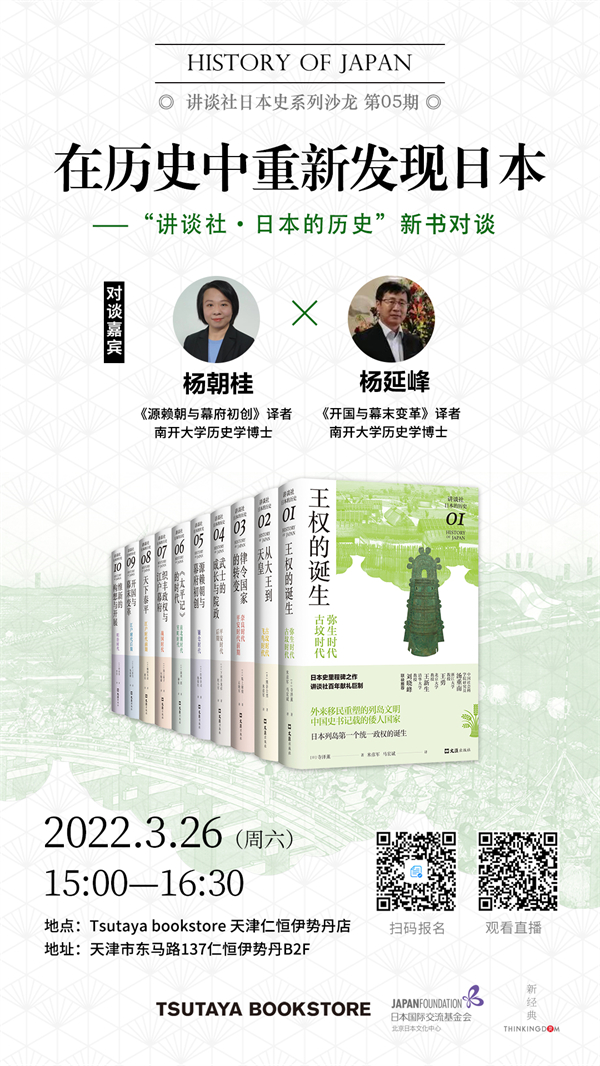
Tianjin | Rediscovering Japan in History —— Dialogue with the new book "The History of Japan by the Talk Club"
Time:March 26th (Saturday) 15:00-16:30.
Location:Renheng Isetan B2F Renwu Bookstore, No.137 Dongma Road, Nankai District
Guest:Yang Chaogui (teacher, School of Foreign Languages and Literature, Tianjin University) and Yang Yanfeng (teacher, Japanese Department, School of Foreign Languages, Tianjin Normal University)
Ukiyo-e, tea ceremony, haiku, kabuki, Er Yuan … Japanese culture has already been quietly integrated into our lives. Historically, the exchanges between China and Japan have lasted for thousands of years, and people’s impression of Japanese history is limited to proper nouns in textbooks. Today, the "Talk Club History of Japan" (all 10 volumes) introduced by the new classic culture fills this vacancy. On March 26th, we invited two translators of this series: Yang Chaogui and Yang Yanfeng, Ph.D. in history of Nankai University, to talk about this series, especially their two works, Yuanlai Dynasty and the Start of the Shogunate and Founding and the Revolution at the End of the Curtain, which led readers to rediscover Japan in history.
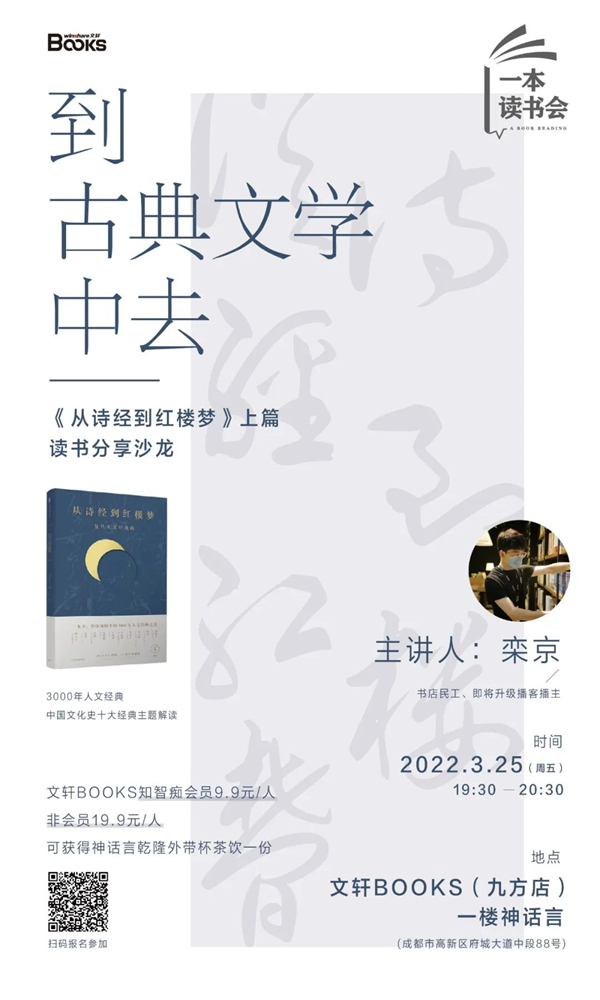
Chengdu | Going into Classical Literature —— From the Book of Songs to a Dream of Red Mansions, the first reading sharing salon
Time:19:30 on Friday, March 25th.
Location:Myth on the first floor of Wenxuan BOOKS, Jiufang Shopping Center, No.88, Middle Section of Fucheng Avenue, High-tech Zone
Speaker:Luan Jing (bookstore clerk, podcast anchor)
Who is the author of the Book of Songs? What’s the difference between Confucius and Mencius and Laozi and Zhuangzi? What are the five parts of Sima Qian’s Historical Records? Does classical culture also need popular science? Wenxuan BOOKS’ first book sharing, from The Book of Songs to A Dream of Red Mansions, published by CITIC Publishing Group, presents 10 themes of Chinese classic culture in 3000 years in a simple way. Luan Jing, a storyteller, is a part-time tour guide, taking everyone upstream along the tourist spots of the times and enjoying the charm of China’s classical culture.
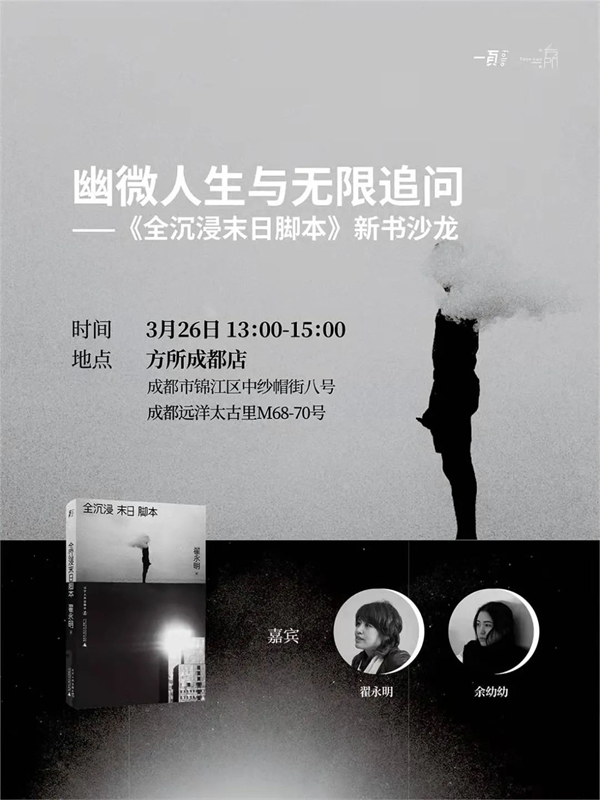
Chengdu | Deep Life and Infinite Questioning —— A new book salon of "Full Immersion Doomsday Script"
Time:March 26th (Saturday) 13:00-15:00.
Location:No.8 Zhongshamao Street, Jinjiang District, No.68-70 Chengdu Yuanyang Taikooli
Guest:Yongming Zhai (poet), Yu Youyou (poet)
As a pivotal and symbolic poet in contemporary poetry, Yongming Zhai has been deeply involved in the exploration of poetry and other types of art for a long time, which has achieved the height of female poetry in China. Full Immersion Doomsday Script is an anthology of her poems in recent years, which not only continues the strong female consciousness in the past, but also gives birth to countless new observations and thoughts beyond it. On the occasion of the publication of this book, Fang Chengdu Store invited the author Yongming Zhai and the young poet Yu Youyou to talk with us about the poet’s shuttle and search in daily details and future imagination, secluded life and infinite questioning.
关于作者